Evaluating the 2015 Amendments to Wills and Estate Law (Part IV)
VerifiedAdded on 2023/04/06
|10
|2224
|373
Essay
AI Summary
This essay provides a critical evaluation of Part IV of the Administrative and Probate Act 1958 (Vic) concerning wills and estate administration, focusing on the impact of the 2015 amendments. It contrasts the pre-2015 approach, which allowed broad claims against estates, with the post-2015 restrictive approach that emphasizes 'eligible persons' and dependency. The essay examines the historical context, the problems with the 'old law,' the specifics of the 2015 amendments, and the concept of testamentary freedom. It argues that while the amendments aim to reduce unprincipled claims, they may not significantly decrease the number of claims overall, as most are initiated by close family members. The essay concludes by questioning whether the family provisions truly align with the testator's intentions and highlights the importance of focusing on will formalities and potential undue influence.
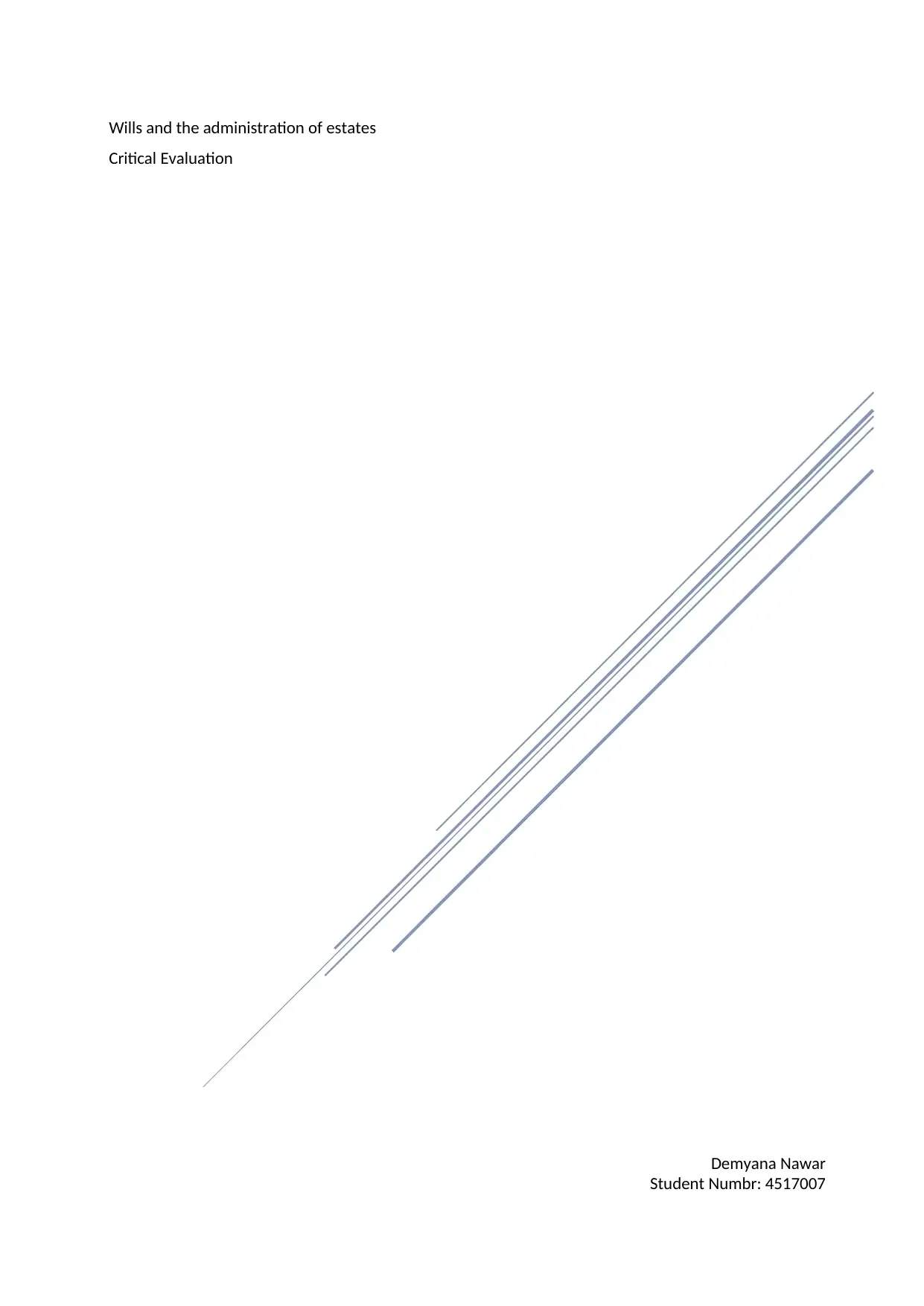
Demyana Nawar
Student Numbr: 4517007
Wills and the administration of estates
Critical Evaluation
Student Numbr: 4517007
Wills and the administration of estates
Critical Evaluation
Paraphrase This Document
Need a fresh take? Get an instant paraphrase of this document with our AI Paraphraser
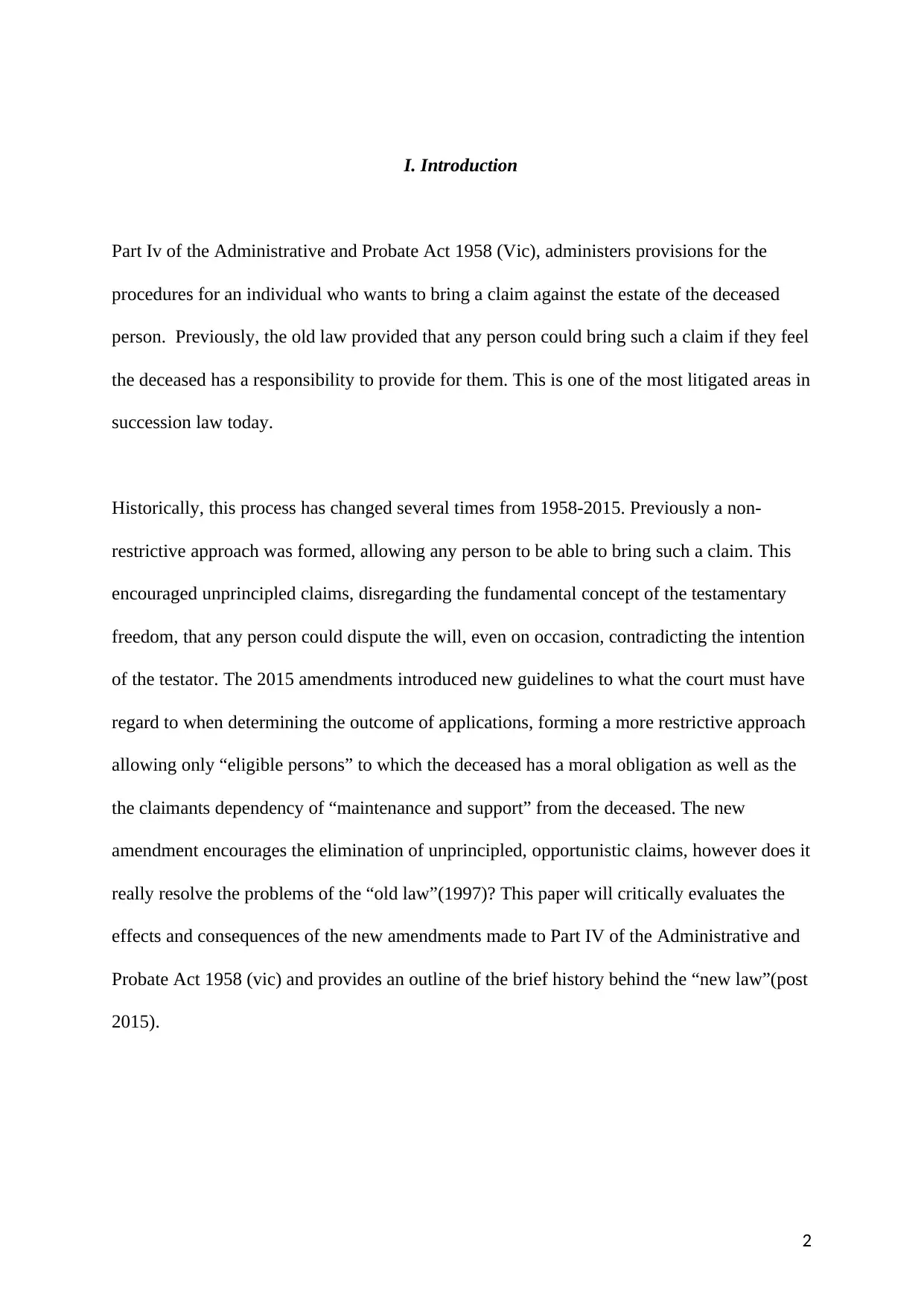
I. Introduction
Part Iv of the Administrative and Probate Act 1958 (Vic), administers provisions for the
procedures for an individual who wants to bring a claim against the estate of the deceased
person. Previously, the old law provided that any person could bring such a claim if they feel
the deceased has a responsibility to provide for them. This is one of the most litigated areas in
succession law today.
Historically, this process has changed several times from 1958-2015. Previously a non-
restrictive approach was formed, allowing any person to be able to bring such a claim. This
encouraged unprincipled claims, disregarding the fundamental concept of the testamentary
freedom, that any person could dispute the will, even on occasion, contradicting the intention
of the testator. The 2015 amendments introduced new guidelines to what the court must have
regard to when determining the outcome of applications, forming a more restrictive approach
allowing only “eligible persons” to which the deceased has a moral obligation as well as the
the claimants dependency of “maintenance and support” from the deceased. The new
amendment encourages the elimination of unprincipled, opportunistic claims, however does it
really resolve the problems of the “old law”(1997)? This paper will critically evaluates the
effects and consequences of the new amendments made to Part IV of the Administrative and
Probate Act 1958 (vic) and provides an outline of the brief history behind the “new law”(post
2015).
2
Part Iv of the Administrative and Probate Act 1958 (Vic), administers provisions for the
procedures for an individual who wants to bring a claim against the estate of the deceased
person. Previously, the old law provided that any person could bring such a claim if they feel
the deceased has a responsibility to provide for them. This is one of the most litigated areas in
succession law today.
Historically, this process has changed several times from 1958-2015. Previously a non-
restrictive approach was formed, allowing any person to be able to bring such a claim. This
encouraged unprincipled claims, disregarding the fundamental concept of the testamentary
freedom, that any person could dispute the will, even on occasion, contradicting the intention
of the testator. The 2015 amendments introduced new guidelines to what the court must have
regard to when determining the outcome of applications, forming a more restrictive approach
allowing only “eligible persons” to which the deceased has a moral obligation as well as the
the claimants dependency of “maintenance and support” from the deceased. The new
amendment encourages the elimination of unprincipled, opportunistic claims, however does it
really resolve the problems of the “old law”(1997)? This paper will critically evaluates the
effects and consequences of the new amendments made to Part IV of the Administrative and
Probate Act 1958 (vic) and provides an outline of the brief history behind the “new law”(post
2015).
2
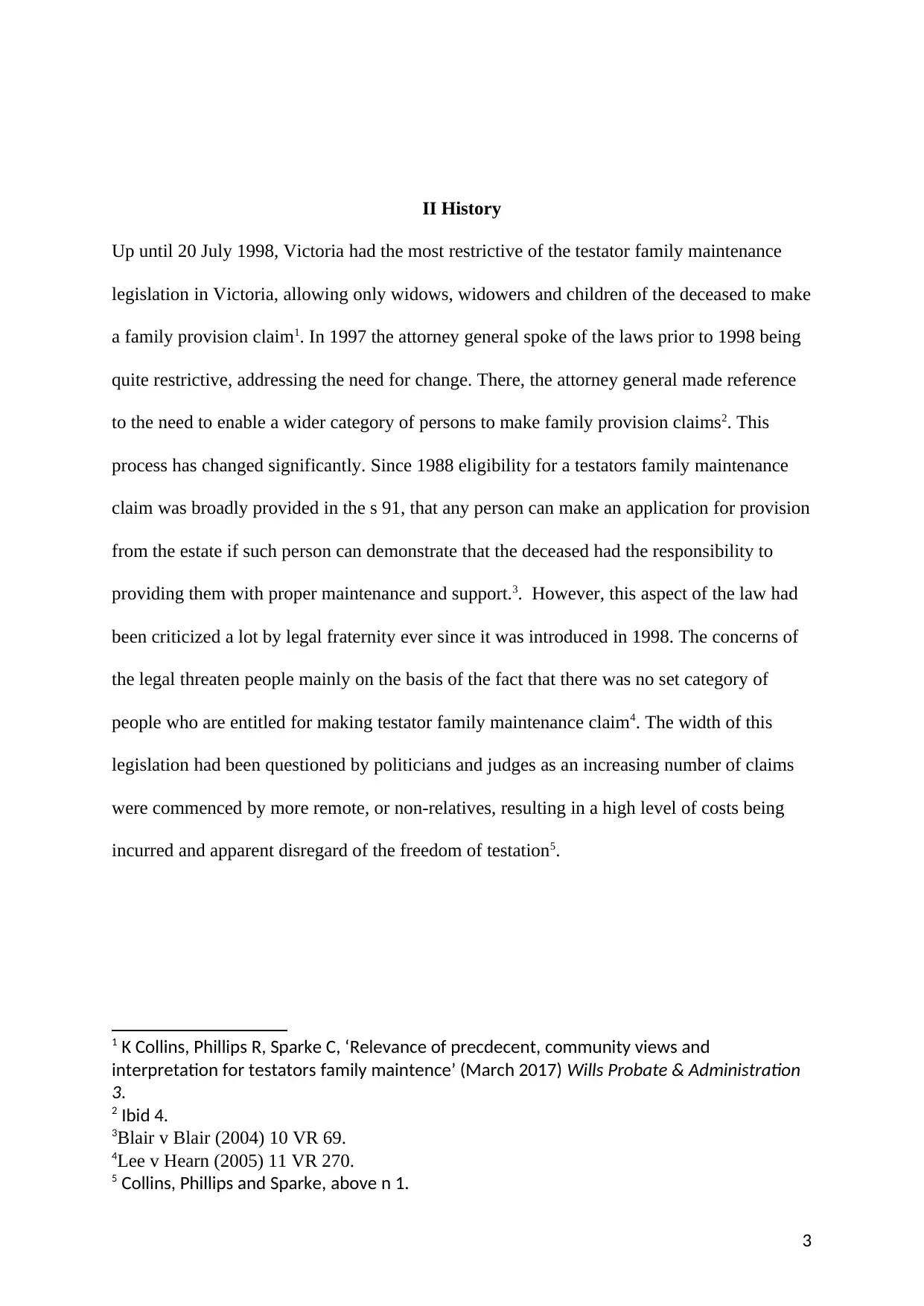
II History
Up until 20 July 1998, Victoria had the most restrictive of the testator family maintenance
legislation in Victoria, allowing only widows, widowers and children of the deceased to make
a family provision claim1. In 1997 the attorney general spoke of the laws prior to 1998 being
quite restrictive, addressing the need for change. There, the attorney general made reference
to the need to enable a wider category of persons to make family provision claims2. This
process has changed significantly. Since 1988 eligibility for a testators family maintenance
claim was broadly provided in the s 91, that any person can make an application for provision
from the estate if such person can demonstrate that the deceased had the responsibility to
providing them with proper maintenance and support.3. However, this aspect of the law had
been criticized a lot by legal fraternity ever since it was introduced in 1998. The concerns of
the legal threaten people mainly on the basis of the fact that there was no set category of
people who are entitled for making testator family maintenance claim4. The width of this
legislation had been questioned by politicians and judges as an increasing number of claims
were commenced by more remote, or non-relatives, resulting in a high level of costs being
incurred and apparent disregard of the freedom of testation5.
1 K Collins, Phillips R, Sparke C, ‘Relevance of precdecent, community views and
interpretation for testators family maintence’ (March 2017) Wills Probate & Administration
3.
2 Ibid 4.
3Blair v Blair (2004) 10 VR 69.
4Lee v Hearn (2005) 11 VR 270.
5 Collins, Phillips and Sparke, above n 1.
3
Up until 20 July 1998, Victoria had the most restrictive of the testator family maintenance
legislation in Victoria, allowing only widows, widowers and children of the deceased to make
a family provision claim1. In 1997 the attorney general spoke of the laws prior to 1998 being
quite restrictive, addressing the need for change. There, the attorney general made reference
to the need to enable a wider category of persons to make family provision claims2. This
process has changed significantly. Since 1988 eligibility for a testators family maintenance
claim was broadly provided in the s 91, that any person can make an application for provision
from the estate if such person can demonstrate that the deceased had the responsibility to
providing them with proper maintenance and support.3. However, this aspect of the law had
been criticized a lot by legal fraternity ever since it was introduced in 1998. The concerns of
the legal threaten people mainly on the basis of the fact that there was no set category of
people who are entitled for making testator family maintenance claim4. The width of this
legislation had been questioned by politicians and judges as an increasing number of claims
were commenced by more remote, or non-relatives, resulting in a high level of costs being
incurred and apparent disregard of the freedom of testation5.
1 K Collins, Phillips R, Sparke C, ‘Relevance of precdecent, community views and
interpretation for testators family maintence’ (March 2017) Wills Probate & Administration
3.
2 Ibid 4.
3Blair v Blair (2004) 10 VR 69.
4Lee v Hearn (2005) 11 VR 270.
5 Collins, Phillips and Sparke, above n 1.
3
⊘ This is a preview!⊘
Do you want full access?
Subscribe today to unlock all pages.

Trusted by 1+ million students worldwide
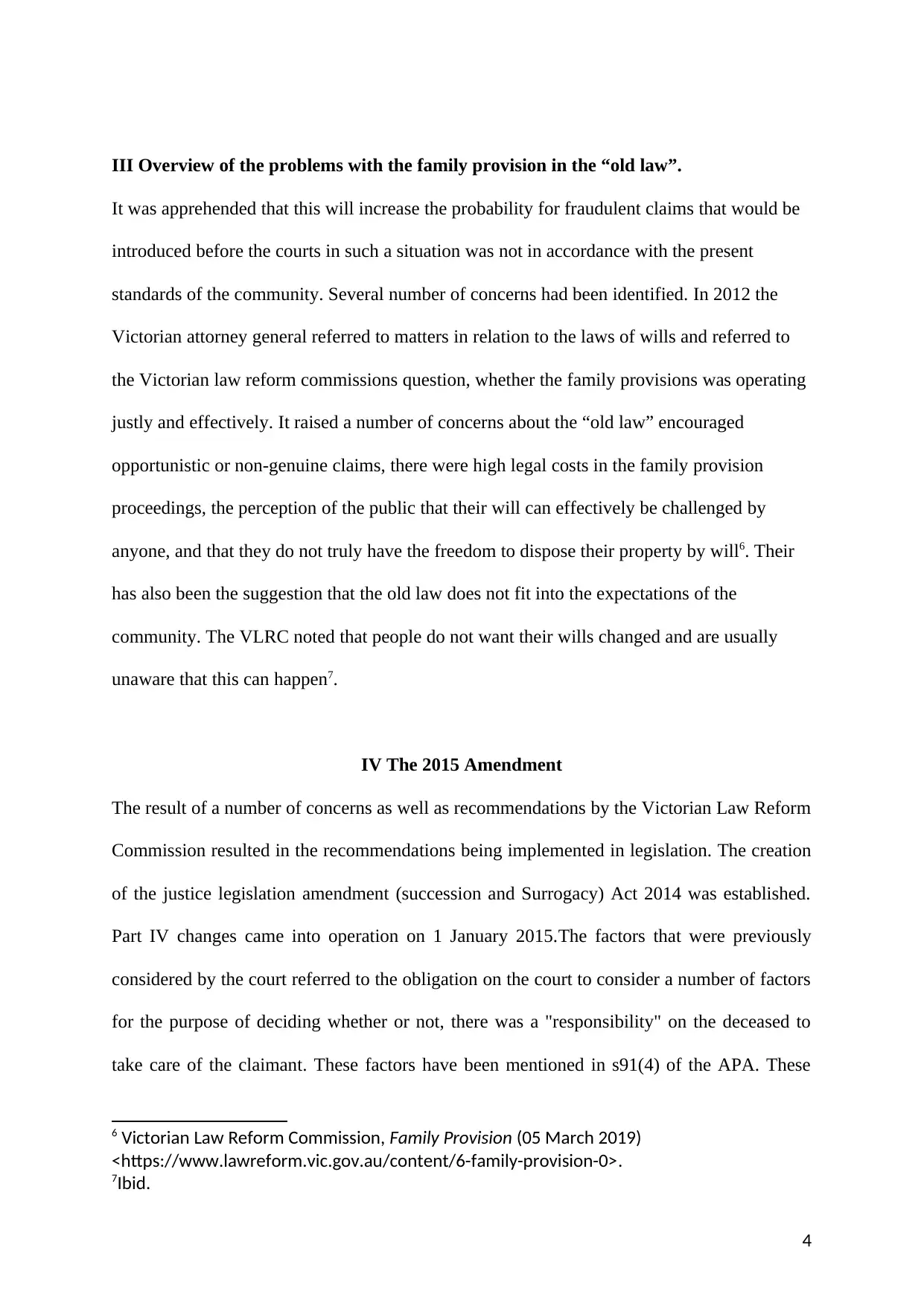
III Overview of the problems with the family provision in the “old law”.
It was apprehended that this will increase the probability for fraudulent claims that would be
introduced before the courts in such a situation was not in accordance with the present
standards of the community. Several number of concerns had been identified. In 2012 the
Victorian attorney general referred to matters in relation to the laws of wills and referred to
the Victorian law reform commissions question, whether the family provisions was operating
justly and effectively. It raised a number of concerns about the “old law” encouraged
opportunistic or non-genuine claims, there were high legal costs in the family provision
proceedings, the perception of the public that their will can effectively be challenged by
anyone, and that they do not truly have the freedom to dispose their property by will6. Their
has also been the suggestion that the old law does not fit into the expectations of the
community. The VLRC noted that people do not want their wills changed and are usually
unaware that this can happen7.
IV The 2015 Amendment
The result of a number of concerns as well as recommendations by the Victorian Law Reform
Commission resulted in the recommendations being implemented in legislation. The creation
of the justice legislation amendment (succession and Surrogacy) Act 2014 was established.
Part IV changes came into operation on 1 January 2015.The factors that were previously
considered by the court referred to the obligation on the court to consider a number of factors
for the purpose of deciding whether or not, there was a "responsibility" on the deceased to
take care of the claimant. These factors have been mentioned in s91(4) of the APA. These
6 Victorian Law Reform Commission, Family Provision (05 March 2019)
<https://www.lawreform.vic.gov.au/content/6-family-provision-0>.
7Ibid.
4
It was apprehended that this will increase the probability for fraudulent claims that would be
introduced before the courts in such a situation was not in accordance with the present
standards of the community. Several number of concerns had been identified. In 2012 the
Victorian attorney general referred to matters in relation to the laws of wills and referred to
the Victorian law reform commissions question, whether the family provisions was operating
justly and effectively. It raised a number of concerns about the “old law” encouraged
opportunistic or non-genuine claims, there were high legal costs in the family provision
proceedings, the perception of the public that their will can effectively be challenged by
anyone, and that they do not truly have the freedom to dispose their property by will6. Their
has also been the suggestion that the old law does not fit into the expectations of the
community. The VLRC noted that people do not want their wills changed and are usually
unaware that this can happen7.
IV The 2015 Amendment
The result of a number of concerns as well as recommendations by the Victorian Law Reform
Commission resulted in the recommendations being implemented in legislation. The creation
of the justice legislation amendment (succession and Surrogacy) Act 2014 was established.
Part IV changes came into operation on 1 January 2015.The factors that were previously
considered by the court referred to the obligation on the court to consider a number of factors
for the purpose of deciding whether or not, there was a "responsibility" on the deceased to
take care of the claimant. These factors have been mentioned in s91(4) of the APA. These
6 Victorian Law Reform Commission, Family Provision (05 March 2019)
<https://www.lawreform.vic.gov.au/content/6-family-provision-0>.
7Ibid.
4
Paraphrase This Document
Need a fresh take? Get an instant paraphrase of this document with our AI Paraphraser
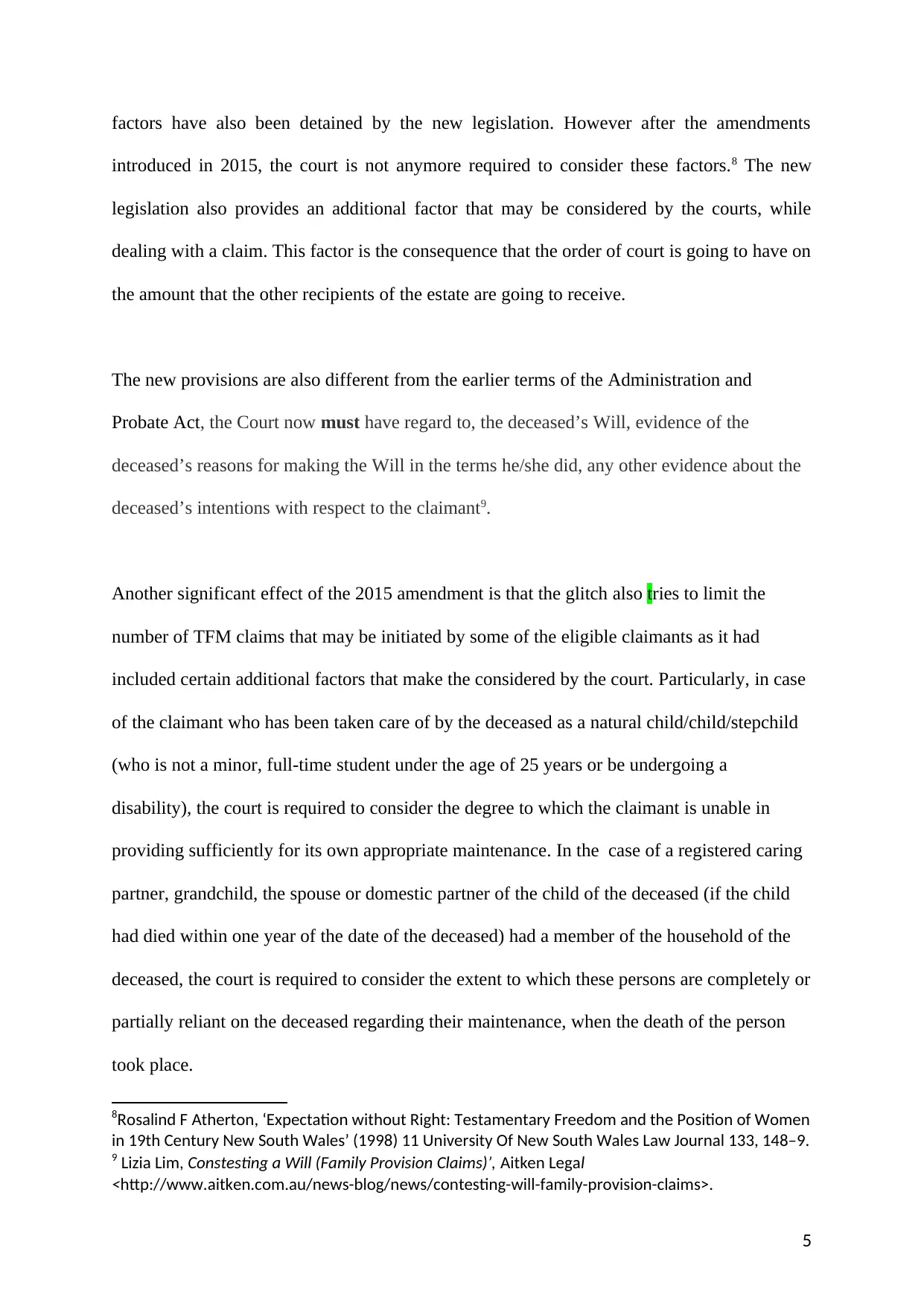
factors have also been detained by the new legislation. However after the amendments
introduced in 2015, the court is not anymore required to consider these factors.8 The new
legislation also provides an additional factor that may be considered by the courts, while
dealing with a claim. This factor is the consequence that the order of court is going to have on
the amount that the other recipients of the estate are going to receive.
The new provisions are also different from the earlier terms of the Administration and
Probate Act, the Court now must have regard to, the deceased’s Will, evidence of the
deceased’s reasons for making the Will in the terms he/she did, any other evidence about the
deceased’s intentions with respect to the claimant9.
Another significant effect of the 2015 amendment is that the glitch also tries to limit the
number of TFM claims that may be initiated by some of the eligible claimants as it had
included certain additional factors that make the considered by the court. Particularly, in case
of the claimant who has been taken care of by the deceased as a natural child/child/stepchild
(who is not a minor, full-time student under the age of 25 years or be undergoing a
disability), the court is required to consider the degree to which the claimant is unable in
providing sufficiently for its own appropriate maintenance. In the case of a registered caring
partner, grandchild, the spouse or domestic partner of the child of the deceased (if the child
had died within one year of the date of the deceased) had a member of the household of the
deceased, the court is required to consider the extent to which these persons are completely or
partially reliant on the deceased regarding their maintenance, when the death of the person
took place.
8Rosalind F Atherton, ‘Expectation without Right: Testamentary Freedom and the Position of Women
in 19th Century New South Wales’ (1998) 11 University Of New South Wales Law Journal 133, 148–9.
9 Lizia Lim, Constesting a Will (Family Provision Claims)’, Aitken Legal
<http://www.aitken.com.au/news-blog/news/contesting-will-family-provision-claims>.
5
introduced in 2015, the court is not anymore required to consider these factors.8 The new
legislation also provides an additional factor that may be considered by the courts, while
dealing with a claim. This factor is the consequence that the order of court is going to have on
the amount that the other recipients of the estate are going to receive.
The new provisions are also different from the earlier terms of the Administration and
Probate Act, the Court now must have regard to, the deceased’s Will, evidence of the
deceased’s reasons for making the Will in the terms he/she did, any other evidence about the
deceased’s intentions with respect to the claimant9.
Another significant effect of the 2015 amendment is that the glitch also tries to limit the
number of TFM claims that may be initiated by some of the eligible claimants as it had
included certain additional factors that make the considered by the court. Particularly, in case
of the claimant who has been taken care of by the deceased as a natural child/child/stepchild
(who is not a minor, full-time student under the age of 25 years or be undergoing a
disability), the court is required to consider the degree to which the claimant is unable in
providing sufficiently for its own appropriate maintenance. In the case of a registered caring
partner, grandchild, the spouse or domestic partner of the child of the deceased (if the child
had died within one year of the date of the deceased) had a member of the household of the
deceased, the court is required to consider the extent to which these persons are completely or
partially reliant on the deceased regarding their maintenance, when the death of the person
took place.
8Rosalind F Atherton, ‘Expectation without Right: Testamentary Freedom and the Position of Women
in 19th Century New South Wales’ (1998) 11 University Of New South Wales Law Journal 133, 148–9.
9 Lizia Lim, Constesting a Will (Family Provision Claims)’, Aitken Legal
<http://www.aitken.com.au/news-blog/news/contesting-will-family-provision-claims>.
5
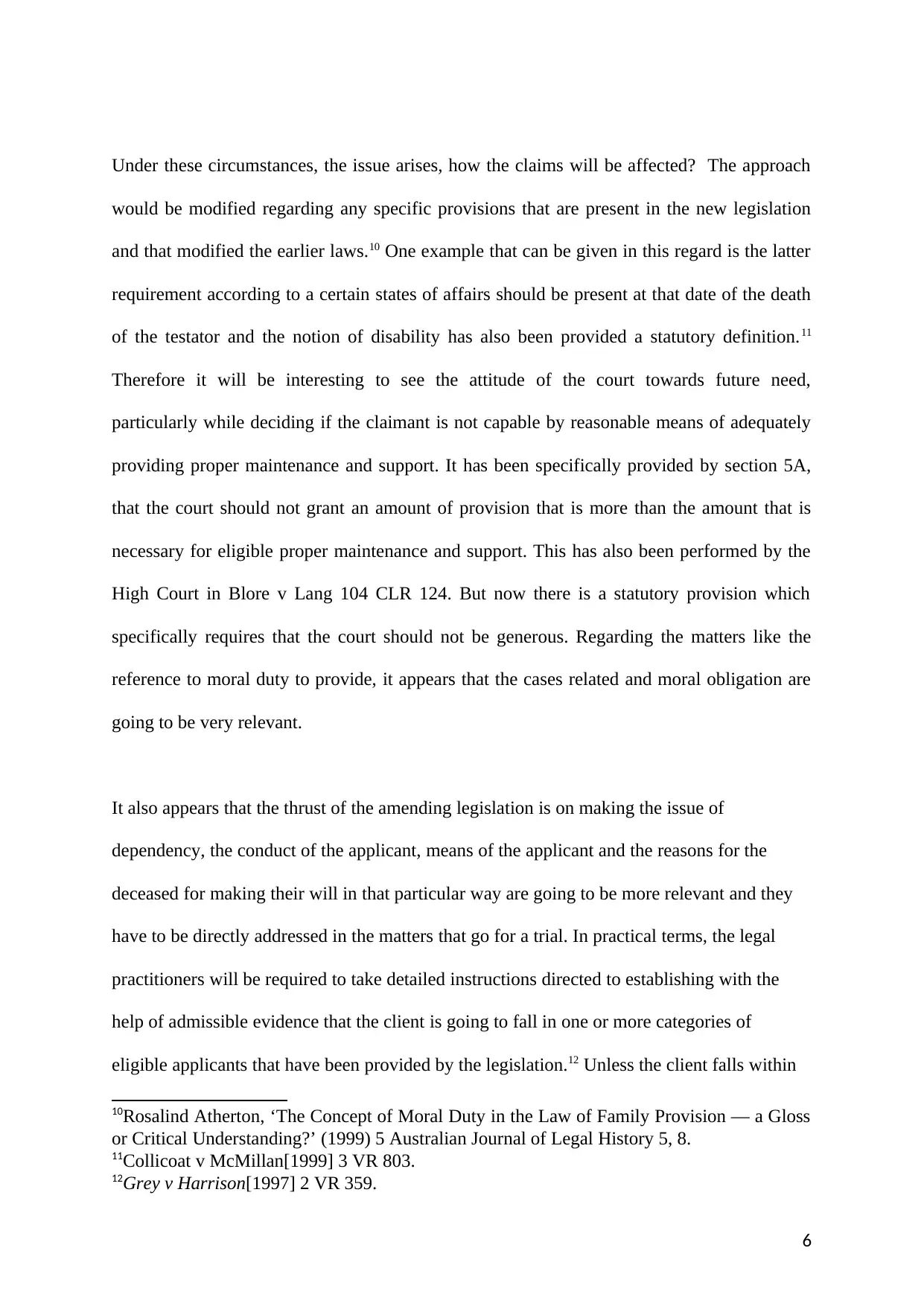
Under these circumstances, the issue arises, how the claims will be affected? The approach
would be modified regarding any specific provisions that are present in the new legislation
and that modified the earlier laws.10 One example that can be given in this regard is the latter
requirement according to a certain states of affairs should be present at that date of the death
of the testator and the notion of disability has also been provided a statutory definition.11
Therefore it will be interesting to see the attitude of the court towards future need,
particularly while deciding if the claimant is not capable by reasonable means of adequately
providing proper maintenance and support. It has been specifically provided by section 5A,
that the court should not grant an amount of provision that is more than the amount that is
necessary for eligible proper maintenance and support. This has also been performed by the
High Court in Blore v Lang 104 CLR 124. But now there is a statutory provision which
specifically requires that the court should not be generous. Regarding the matters like the
reference to moral duty to provide, it appears that the cases related and moral obligation are
going to be very relevant.
It also appears that the thrust of the amending legislation is on making the issue of
dependency, the conduct of the applicant, means of the applicant and the reasons for the
deceased for making their will in that particular way are going to be more relevant and they
have to be directly addressed in the matters that go for a trial. In practical terms, the legal
practitioners will be required to take detailed instructions directed to establishing with the
help of admissible evidence that the client is going to fall in one or more categories of
eligible applicants that have been provided by the legislation.12 Unless the client falls within
10Rosalind Atherton, ‘The Concept of Moral Duty in the Law of Family Provision — a Gloss
or Critical Understanding?’ (1999) 5 Australian Journal of Legal History 5, 8.
11Collicoat v McMillan[1999] 3 VR 803.
12Grey v Harrison[1997] 2 VR 359.
6
would be modified regarding any specific provisions that are present in the new legislation
and that modified the earlier laws.10 One example that can be given in this regard is the latter
requirement according to a certain states of affairs should be present at that date of the death
of the testator and the notion of disability has also been provided a statutory definition.11
Therefore it will be interesting to see the attitude of the court towards future need,
particularly while deciding if the claimant is not capable by reasonable means of adequately
providing proper maintenance and support. It has been specifically provided by section 5A,
that the court should not grant an amount of provision that is more than the amount that is
necessary for eligible proper maintenance and support. This has also been performed by the
High Court in Blore v Lang 104 CLR 124. But now there is a statutory provision which
specifically requires that the court should not be generous. Regarding the matters like the
reference to moral duty to provide, it appears that the cases related and moral obligation are
going to be very relevant.
It also appears that the thrust of the amending legislation is on making the issue of
dependency, the conduct of the applicant, means of the applicant and the reasons for the
deceased for making their will in that particular way are going to be more relevant and they
have to be directly addressed in the matters that go for a trial. In practical terms, the legal
practitioners will be required to take detailed instructions directed to establishing with the
help of admissible evidence that the client is going to fall in one or more categories of
eligible applicants that have been provided by the legislation.12 Unless the client falls within
10Rosalind Atherton, ‘The Concept of Moral Duty in the Law of Family Provision — a Gloss
or Critical Understanding?’ (1999) 5 Australian Journal of Legal History 5, 8.
11Collicoat v McMillan[1999] 3 VR 803.
12Grey v Harrison[1997] 2 VR 359.
6
⊘ This is a preview!⊘
Do you want full access?
Subscribe today to unlock all pages.

Trusted by 1+ million students worldwide
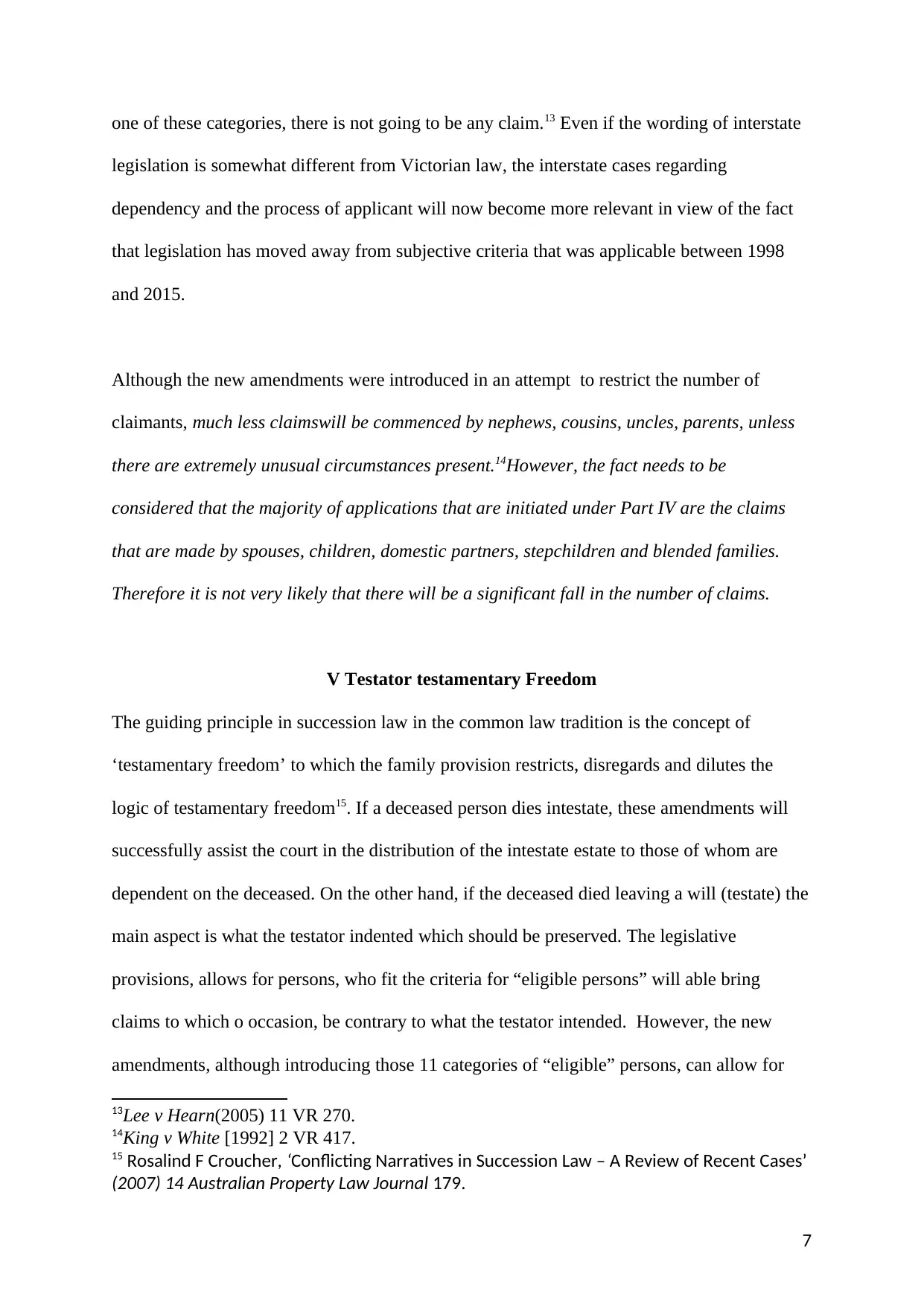
one of these categories, there is not going to be any claim.13 Even if the wording of interstate
legislation is somewhat different from Victorian law, the interstate cases regarding
dependency and the process of applicant will now become more relevant in view of the fact
that legislation has moved away from subjective criteria that was applicable between 1998
and 2015.
Although the new amendments were introduced in an attempt to restrict the number of
claimants, much less claimswill be commenced by nephews, cousins, uncles, parents, unless
there are extremely unusual circumstances present.14However, the fact needs to be
considered that the majority of applications that are initiated under Part IV are the claims
that are made by spouses, children, domestic partners, stepchildren and blended families.
Therefore it is not very likely that there will be a significant fall in the number of claims.
V Testator testamentary Freedom
The guiding principle in succession law in the common law tradition is the concept of
‘testamentary freedom’ to which the family provision restricts, disregards and dilutes the
logic of testamentary freedom15. If a deceased person dies intestate, these amendments will
successfully assist the court in the distribution of the intestate estate to those of whom are
dependent on the deceased. On the other hand, if the deceased died leaving a will (testate) the
main aspect is what the testator indented which should be preserved. The legislative
provisions, allows for persons, who fit the criteria for “eligible persons” will able bring
claims to which o occasion, be contrary to what the testator intended. However, the new
amendments, although introducing those 11 categories of “eligible” persons, can allow for
13Lee v Hearn(2005) 11 VR 270.
14King v White [1992] 2 VR 417.
15 Rosalind F Croucher, ‘Conflicting Narratives in Succession Law – A Review of Recent Cases’
(2007) 14 Australian Property Law Journal 179.
7
legislation is somewhat different from Victorian law, the interstate cases regarding
dependency and the process of applicant will now become more relevant in view of the fact
that legislation has moved away from subjective criteria that was applicable between 1998
and 2015.
Although the new amendments were introduced in an attempt to restrict the number of
claimants, much less claimswill be commenced by nephews, cousins, uncles, parents, unless
there are extremely unusual circumstances present.14However, the fact needs to be
considered that the majority of applications that are initiated under Part IV are the claims
that are made by spouses, children, domestic partners, stepchildren and blended families.
Therefore it is not very likely that there will be a significant fall in the number of claims.
V Testator testamentary Freedom
The guiding principle in succession law in the common law tradition is the concept of
‘testamentary freedom’ to which the family provision restricts, disregards and dilutes the
logic of testamentary freedom15. If a deceased person dies intestate, these amendments will
successfully assist the court in the distribution of the intestate estate to those of whom are
dependent on the deceased. On the other hand, if the deceased died leaving a will (testate) the
main aspect is what the testator indented which should be preserved. The legislative
provisions, allows for persons, who fit the criteria for “eligible persons” will able bring
claims to which o occasion, be contrary to what the testator intended. However, the new
amendments, although introducing those 11 categories of “eligible” persons, can allow for
13Lee v Hearn(2005) 11 VR 270.
14King v White [1992] 2 VR 417.
15 Rosalind F Croucher, ‘Conflicting Narratives in Succession Law – A Review of Recent Cases’
(2007) 14 Australian Property Law Journal 179.
7
Paraphrase This Document
Need a fresh take? Get an instant paraphrase of this document with our AI Paraphraser
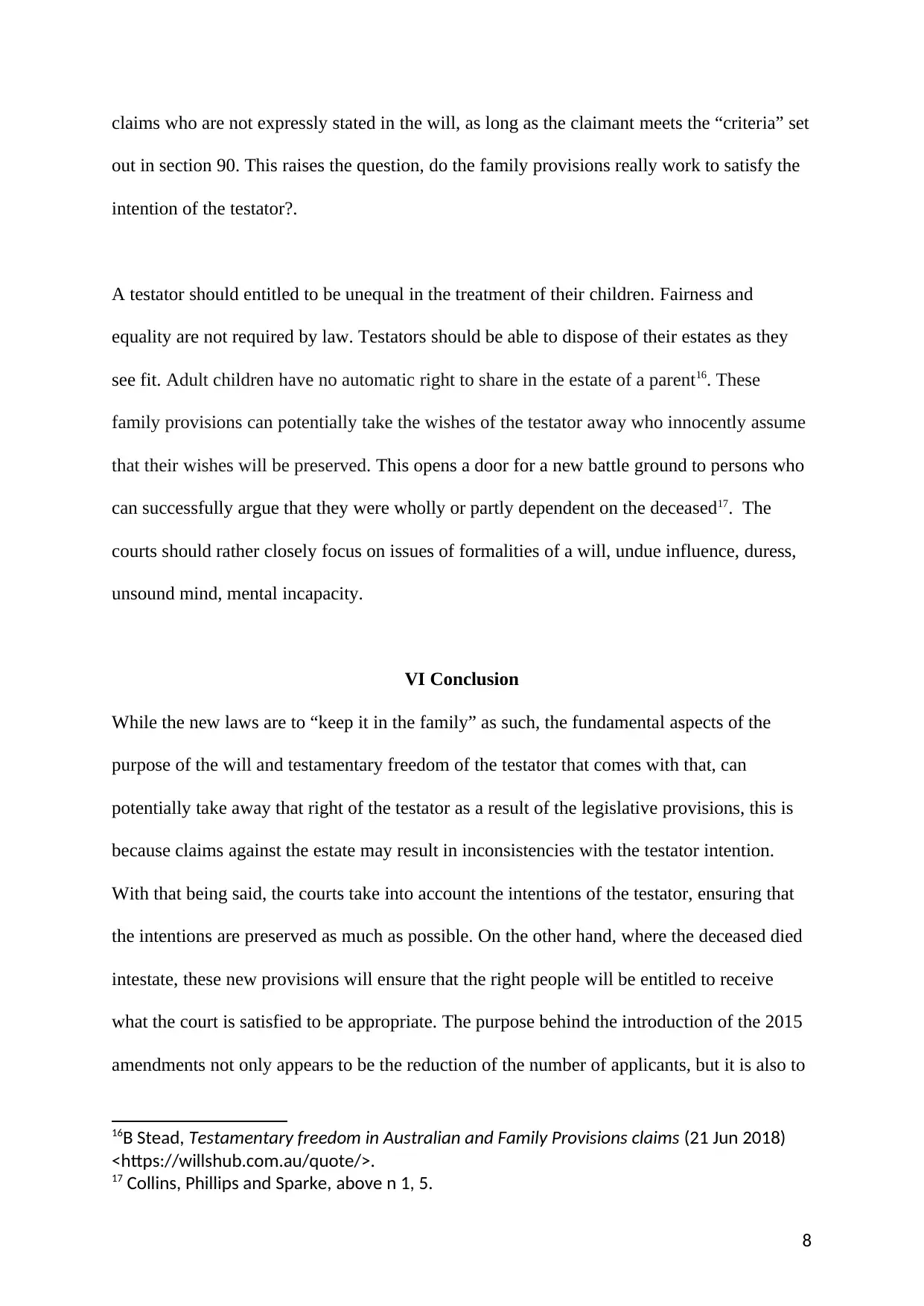
claims who are not expressly stated in the will, as long as the claimant meets the “criteria” set
out in section 90. This raises the question, do the family provisions really work to satisfy the
intention of the testator?.
A testator should entitled to be unequal in the treatment of their children. Fairness and
equality are not required by law. Testators should be able to dispose of their estates as they
see fit. Adult children have no automatic right to share in the estate of a parent16. These
family provisions can potentially take the wishes of the testator away who innocently assume
that their wishes will be preserved. This opens a door for a new battle ground to persons who
can successfully argue that they were wholly or partly dependent on the deceased17. The
courts should rather closely focus on issues of formalities of a will, undue influence, duress,
unsound mind, mental incapacity.
VI Conclusion
While the new laws are to “keep it in the family” as such, the fundamental aspects of the
purpose of the will and testamentary freedom of the testator that comes with that, can
potentially take away that right of the testator as a result of the legislative provisions, this is
because claims against the estate may result in inconsistencies with the testator intention.
With that being said, the courts take into account the intentions of the testator, ensuring that
the intentions are preserved as much as possible. On the other hand, where the deceased died
intestate, these new provisions will ensure that the right people will be entitled to receive
what the court is satisfied to be appropriate. The purpose behind the introduction of the 2015
amendments not only appears to be the reduction of the number of applicants, but it is also to
16B Stead, Testamentary freedom in Australian and Family Provisions claims (21 Jun 2018)
<https://willshub.com.au/quote/>.
17 Collins, Phillips and Sparke, above n 1, 5.
8
out in section 90. This raises the question, do the family provisions really work to satisfy the
intention of the testator?.
A testator should entitled to be unequal in the treatment of their children. Fairness and
equality are not required by law. Testators should be able to dispose of their estates as they
see fit. Adult children have no automatic right to share in the estate of a parent16. These
family provisions can potentially take the wishes of the testator away who innocently assume
that their wishes will be preserved. This opens a door for a new battle ground to persons who
can successfully argue that they were wholly or partly dependent on the deceased17. The
courts should rather closely focus on issues of formalities of a will, undue influence, duress,
unsound mind, mental incapacity.
VI Conclusion
While the new laws are to “keep it in the family” as such, the fundamental aspects of the
purpose of the will and testamentary freedom of the testator that comes with that, can
potentially take away that right of the testator as a result of the legislative provisions, this is
because claims against the estate may result in inconsistencies with the testator intention.
With that being said, the courts take into account the intentions of the testator, ensuring that
the intentions are preserved as much as possible. On the other hand, where the deceased died
intestate, these new provisions will ensure that the right people will be entitled to receive
what the court is satisfied to be appropriate. The purpose behind the introduction of the 2015
amendments not only appears to be the reduction of the number of applicants, but it is also to
16B Stead, Testamentary freedom in Australian and Family Provisions claims (21 Jun 2018)
<https://willshub.com.au/quote/>.
17 Collins, Phillips and Sparke, above n 1, 5.
8
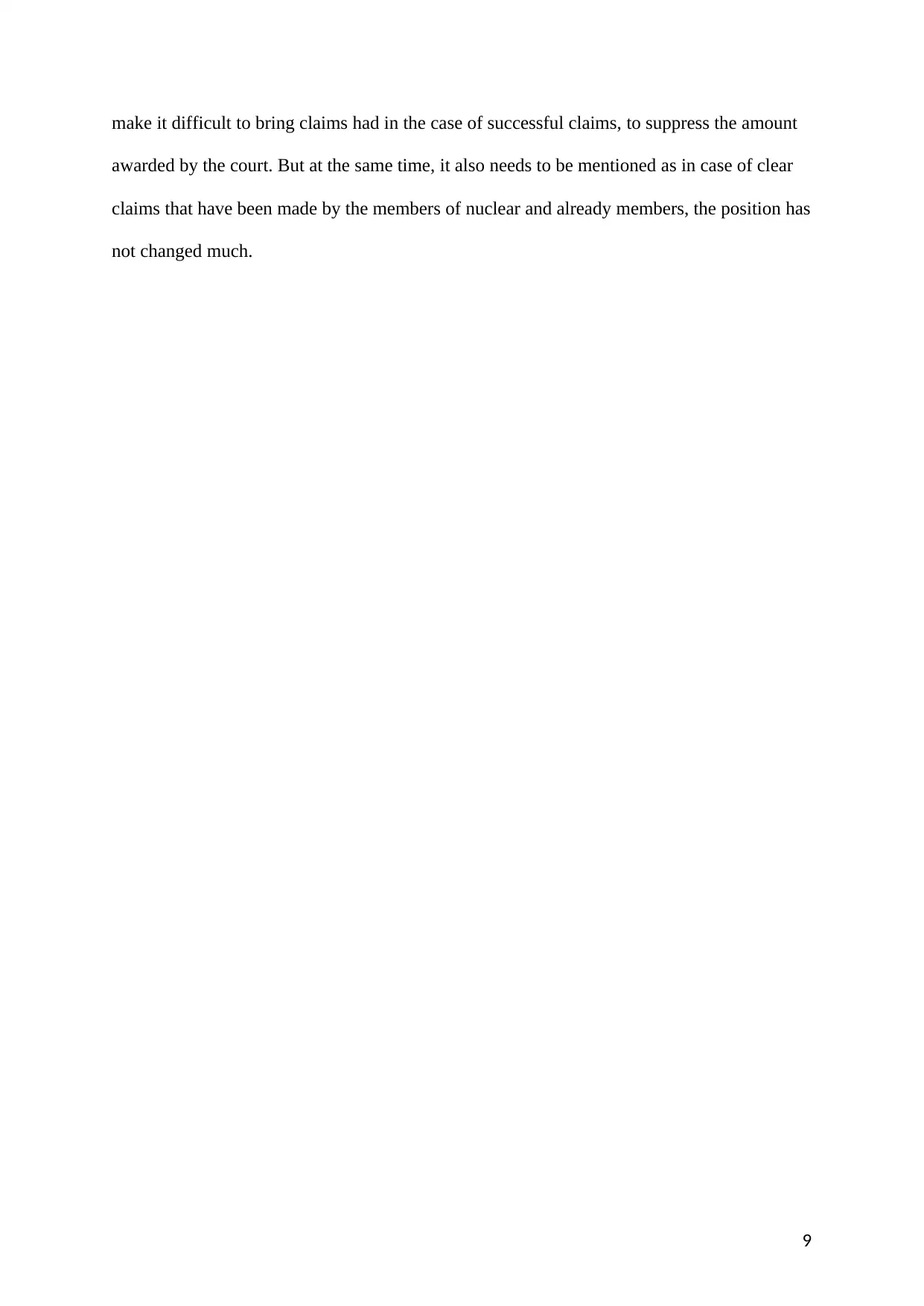
make it difficult to bring claims had in the case of successful claims, to suppress the amount
awarded by the court. But at the same time, it also needs to be mentioned as in case of clear
claims that have been made by the members of nuclear and already members, the position has
not changed much.
9
awarded by the court. But at the same time, it also needs to be mentioned as in case of clear
claims that have been made by the members of nuclear and already members, the position has
not changed much.
9
⊘ This is a preview!⊘
Do you want full access?
Subscribe today to unlock all pages.

Trusted by 1+ million students worldwide

BIBLIOGRAPHY
10
10
1 out of 10
Your All-in-One AI-Powered Toolkit for Academic Success.
+13062052269
info@desklib.com
Available 24*7 on WhatsApp / Email
![[object Object]](/_next/static/media/star-bottom.7253800d.svg)
Unlock your academic potential
Copyright © 2020–2026 A2Z Services. All Rights Reserved. Developed and managed by ZUCOL.


